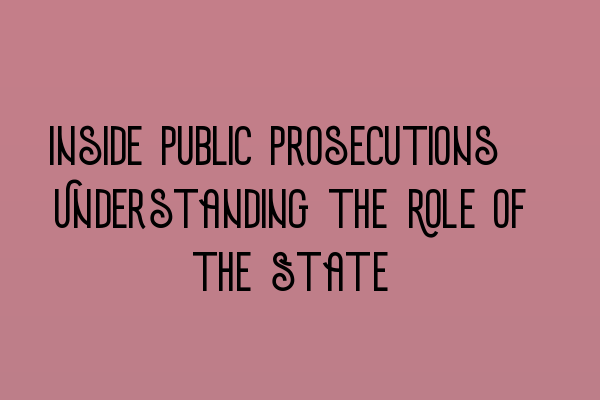Inside Public Prosecutions: Understanding the Role of the State
When it comes to criminal law, the role of the state is crucial in upholding justice and maintaining social order. Public prosecutions play a vital role in ensuring that individuals who commit crimes are held accountable for their actions. In this article, we will delve into the intricacies of the state’s role in criminal prosecutions, exploring the principles and responsibilities involved.
The Function of Public Prosecutions
Public prosecutions are conducted by government institutions and agencies, primarily by the Crown Prosecution Service (CPS) in England and Wales. The main objective of public prosecutions is to represent the interests of the state, acting as an impartial body responsible for bringing criminal charges against alleged offenders.
The CPS assesses the evidence provided by the police and decides whether there is enough evidence to proceed with a prosecution. This determination involves considering the likelihood of conviction and the public interest in pursuing the case. The CPS plays a crucial role in ensuring that cases are dealt with fairly and justly.
The Role of the Crown Prosecution Service (CPS)
The CPS is a vital component of the criminal justice system in England and Wales. Its core responsibilities include:
- Reviewing cases submitted by the police:
- Making charging decisions:
- Preparing and presenting cases in court:
- Acting as an unbiased advocate in court:
The CPS carefully reviews the evidence submitted by the police to determine if it meets the legal threshold required for a prosecution. This review process involves considering the strength of the evidence, the credibility of witnesses, and any potential defenses raised by the accused.
Based on the evidence provided, the CPS decides whether to initiate criminal charges against the accused. This decision is made in accordance with the Code for Crown Prosecutors, which sets out the criteria for prosecuting a case, including the sufficiency of evidence and the public interest in pursuing the charges.
If the CPS decides to prosecute a case, its prosecutors prepare the necessary legal and factual arguments for presentation in court. They work closely with the police and other relevant agencies to build a robust case against the accused.
During criminal proceedings, CPS prosecutors present the case against the accused, seeking to prove their guilt beyond a reasonable doubt. Acting as an unbiased advocate, they endeavor to ensure a fair trial while upholding justice on behalf of the state.
The Importance of Public Prosecutions
Public prosecutions play a fundamental role in maintaining the rule of law and protecting the rights of all citizens. They serve as a safeguard against criminal behavior, instilling confidence in the justice system and deterring potential offenders.
By representing the interests of the state, public prosecutions ensure that no one is above the law. They contribute to the fair and effective administration of justice, allowing individuals to seek redress for the harm they have suffered and deterring future criminal conduct.
Understanding the inner workings of public prosecutions is crucial for aspiring criminal law professionals. If you are preparing for the SQE 1 exam, it is important to familiarize yourself with the principles and practices involved in public prosecutions. SQE 1 Practice Exam Questions and SQE 1 Practice Mocks FLK1 FLK2 can help you test your knowledge and enhance your preparation.
Preparation for a Career in Criminal Law
If you are looking to specialize in criminal law and pursue a career as a solicitor, it is essential to undertake comprehensive preparation. The SQE 1 and SQE 2 exams are designed to assess the competence of aspiring solicitors in various areas of legal practice, including criminal law.
To excel in the SQE exams and develop a solid foundation in criminal law, enrolling in SQE 2 Preparation Courses and SQE 1 Preparation Courses is highly recommended. These courses offer comprehensive study materials, guidance from experienced tutors, and mock exams to enhance your understanding and boost your chances of success.
Stay up to date with the latest developments in criminal law and ensure you are well-prepared for the SQE exams. For important dates and information regarding the SRA SQE Exam, refer to SRA SQE Exam Dates.
Remember, a career in criminal law requires a deep understanding of the law, exceptional analytical skills, and the ability to advocate effectively. By gaining valuable knowledge and practical experience, you can embark on a successful journey in this challenging and rewarding field.
